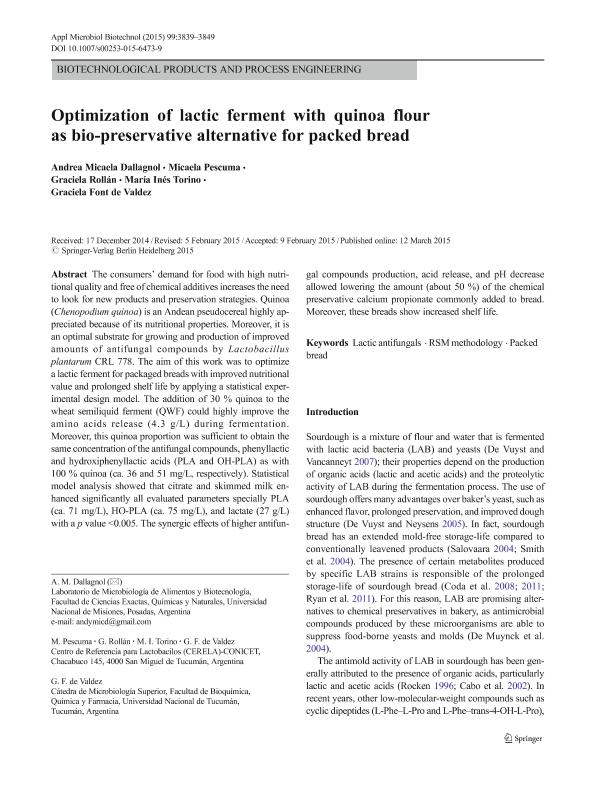Mostrar el registro sencillo del ítem
dc.contributor.author
Dallagnol, Andrea Micaela

dc.contributor.author
Pescuma, Micaela

dc.contributor.author
Rollan, Graciela Celestina

dc.contributor.author
Torino, Maria Ines

dc.contributor.author
Font, Graciela Maria

dc.date.available
2017-11-21T15:06:03Z
dc.date.issued
2015-03-12
dc.identifier.citation
Dallagnol, Andrea Micaela; Pescuma, Micaela; Rollan, Graciela Celestina; Torino, Maria Ines; Font, Graciela Maria; Optimization of lactic ferment with quinoa flour as bio-preservative alternative for packed bread; Springer Verlag Berlín; Applied Microbiology and Biotechnology; 99; 9; 12-3-2015; 3839-3849
dc.identifier.issn
0175-7598
dc.identifier.uri
http://hdl.handle.net/11336/28597
dc.description.abstract
The consumers demand for food with high nutritional quality and free of chemical additives increases the need to look for new products and preservation strategies. Quinoa (Chenopodium quinoa) is an Andean pseudocereal highly appreciated because of its nutritional properties. Moreover, it is an optimal substrate for growing and production of improved amounts of antifungal compounds by Lactobacillus plantarum CRL 778. The aim of this work was to optimize a lactic ferment for packaged breads with improved nutritional value and prolonged shelf life by applying a statistical experimental design model. The addition of 30% quinoa to the wheat semi-liquid ferment (QWF) could highly improve the amino acids release (4.3 g/L) during fermentation. Moreover, this quinoa proportion was sufficient to obtain the same concentration of the antifungal compounds, phenyllactic and hydroxiphenyllactic acids (PLA and OH-PLA) as with 100% quinoa (ca. 36 and 51 mg/L, respectively). Statistical model analysis showed that citrate and skimmed milk enhanced significantly all evaluated parameters specially PLA (ca. 71 mg/L), HO-PLA (ca. 75 mg/L) and lactate (27 g/L) with a p value < 0.005. The synergic effects of higher antifungal compounds production, acids release and pH decrease allowed lowering the amount (about 50 %) of the chemical preservative calcium propionate commonly added to bread. Moreover, these breads show increased shelf life.
dc.format
application/pdf
dc.language.iso
eng
dc.publisher
Springer Verlag Berlín

dc.rights
info:eu-repo/semantics/openAccess
dc.rights.uri
https://creativecommons.org/licenses/by-nc-sa/2.5/ar/
dc.subject
Lactic Antifungals
dc.subject
Rsm Methodology
dc.subject
Packed Bread
dc.subject.classification
Biotecnología Industrial

dc.subject.classification
Biotecnología Industrial

dc.subject.classification
INGENIERÍAS Y TECNOLOGÍAS

dc.title
Optimization of lactic ferment with quinoa flour as bio-preservative alternative for packed bread
dc.type
info:eu-repo/semantics/article
dc.type
info:ar-repo/semantics/artículo
dc.type
info:eu-repo/semantics/publishedVersion
dc.date.updated
2017-07-03T20:44:47Z
dc.identifier.eissn
1432-0614
dc.journal.volume
99
dc.journal.number
9
dc.journal.pagination
3839-3849
dc.journal.pais
Alemania

dc.journal.ciudad
Berlin
dc.description.fil
Fil: Dallagnol, Andrea Micaela. Universidad Nacional de Misiones; Argentina. Consejo Nacional de Investigaciones Científicas y Técnicas; Argentina
dc.description.fil
Fil: Pescuma, Micaela. Consejo Nacional de Investigaciones Científicas y Técnicas. Centro Científico Tecnológico Conicet - Tucuman. Centro de Referencia Para Lactobacilos; Argentina
dc.description.fil
Fil: Rollan, Graciela Celestina. Consejo Nacional de Investigaciones Científicas y Técnicas. Centro Científico Tecnológico Conicet - Tucuman. Centro de Referencia Para Lactobacilos; Argentina
dc.description.fil
Fil: Torino, Maria Ines. Consejo Nacional de Investigaciones Científicas y Técnicas. Centro Científico Tecnológico Conicet - Tucuman. Centro de Referencia Para Lactobacilos; Argentina
dc.description.fil
Fil: Font, Graciela Maria. Consejo Nacional de Investigaciones Científicas y Técnicas. Centro Científico Tecnológico Conicet - Tucuman. Centro de Referencia Para Lactobacilos; Argentina. Universidad Nacional de Tucumán. Facultad de Bioquímica, Química y Farmacia; Argentina
dc.journal.title
Applied Microbiology and Biotechnology

dc.relation.alternativeid
info:eu-repo/semantics/altIdentifier/doi/http://dx.doi.org/10.1007/s00253-015-6473-9
dc.relation.alternativeid
info:eu-repo/semantics/altIdentifier/url/https://link.springer.com/article/10.1007%2Fs00253-015-6473-9
Archivos asociados
